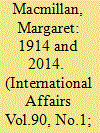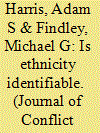| Srl | Item |
| 1 |
ID:
131415


|
|
|
|
|
| Publication |
2014.
|
| Summary/Abstract |
The outbreak of the First World War remains a great historical puzzle and a source of concern, for if we do not understand how it came about we run the risk of stumbling into a similar catastrophe. This article draws parallels between the world of 1914 and the present. It starts with comfortable assumptions made by so many, then and now, that a major conflict was impossible or improbable and then looks at the paradox that globalization not only made the world more interdependent and linked, but also fostered intense local and national identities. It suggests factors that propelled Europe to war in 1914, including national rivalries, imperialism, the arms race and a shifting power balance between rising and declining powers, as well as ideologies and assumptions such as Social Darwinism and militarism, and points out that similar forces and ideas are present today. The article also stresses the dangerous complacency that can arise as a result of decision-makers having successfully dealt with a series of crises. European decision-makers also assumed that they could successfully use war as an instrument of policy and largely ignored or explained away the mounting evidence that the advantage in conflict was swinging to the defence. Again, as the author points out, there are disquieting parallels with the present.
|
|
|
|
|
|
|
|
|
|
|
|
|
|
|
|
| 2 |
ID:
128956


|
|
|
|
|
| Publication |
2014.
|
| Summary/Abstract |
Ethnicity is frequently posited as an important factor in civil violence and other political contexts. Despite the attention that ethnicity receives, its effects depend on an important, but mostly ignored, assumption that ethnicity is identifiable within and across groups. There is likely considerable variation in peoples' abilities to identify each other. Certain individuals within groups might be better at identifying others' ethnicities; further, different types of information might aid identification better. We contend that the strength of an individual's ethnic identity influences her ability to identify others correctly. We test this argument using an experiment in the Eastern Cape of South Africa in which individuals attempted to identify members of the major black ethnic groups. We find that the average individual struggles to identify ethnicity correctly in many conditions. Individuals with a stronger identity, however, are often better at correctly identifying the ethnicity of others relative to the average individual. When receiving contradictory information, individuals with stronger identities were sometimes deceived more easily than others. These results have implications for a diverse set of studies relying on the identifiability assumption.
|
|
|
|
|
|
|
|
|
|
|
|
|
|
|
|